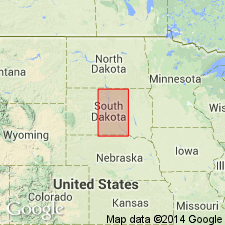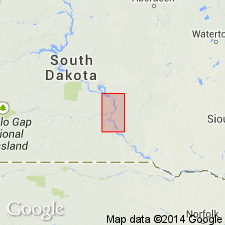
- Usage in publication:
-
- Oacoma zone
- Modifications:
-
- Named
- Dominant lithology:
-
- Shale
- Bentonite
- AAPG geologic province:
-
- Sioux uplift
- Williston basin
Summary:
Pg. 23, pls. 2, 3. Oacoma zone (also referred to as Oacoma manganiferous zone and Oacoma beds). Medial zone in Sully member (new) of Pierre formation. Consists of banded bentonite shales with manganese-iron concretions. Age is Cretaceous.
Exposed along Missouri River below the Great Bend and southward. Town of Oacoma is in Lyman Co., SD (Sioux uplift). [Type localty and origin of name not stated by author (GNU records, USGS DDS-6; Denver GNULEX, Dec. 19, 1986).]
A measured section on hill along U.S. Highway 16 beginning 1.3 mi west of Oacoma, Lyman Co., SD, and extending 1.5 mi farther west could be considered the type section [GNU staff did (Dec. 19, 1986).]
Consists of gray shale varying from a few inches to a few feet in thickness alternating with very thin beds of bentonite and bentonite clay. Forms barren, rounded clay knobs draped over with dark, black, and purplish black, manganiferous concretions. Manganese-iron concretions occur in greatest profusion in vicinity of Chamberlain, Buffalo Co, and Oacoma, Lyman Co, SD, on Sioux uplift, but they also occur in outcrops as far south as Charles Mix Co on Sioux uplift and about mouth of Cheyenne River in Armstrong and Sully Cos, Williston basin. North of this locality they occur in lesser quantity. Gives measured sections at several localities along Missouri River, SD, including a section [type section] on hill along U.S. Hwy 16 beginning 1.3 mi west of Oacoma, Lyman Co, and extending l 1/2 mi [farther west]. Thickness 40 ft in section west of Oacoma; varies from 20 to 46 ft elsewhere. Overlain by Verendrye beds (new) of Pierre; underlain by Agency shale or where Agency shale is absent, by Gregory member of Pierre. Lists fossils. Shows distribution along Missouri River valley, SD in Williston basin and on Sioux uplift.
Source: GNU records (USGS DDS-6; Denver GNULEX).

- Usage in publication:
-
- Oacoma zone
- Modifications:
-
- Overview
- AAPG geologic province:
-
- Sioux uplift
- Williston basin
Summary:
Is a subdivision of Sully member of Pierre formation. Divided into upper and lower beds. Lower beds have relatively few concretions and few bentonites, whereas both are abundant in upper division. Gradationally overlain by Verendrye zone. North of the vicinity of Crow Creek, Buffalo Co, SD, gradationally underlain by Agency zone. Agency zone not recognized at Crow Creek and from there southward in the Missouri River valley, although it may be represented in lower beds of Oacoma zone. Underlain sharply but apparently conformably by the Crow Creek zone (new) at Crow Creek and from there southward. Gives sections in Gregory, Brule, Lyman, Buffalo, and Hughes Cos, SD on Sioux uplift and in Williston basin. Discusses correlation of bentonite beds and stratigraphic relations with Agency zone. Age not discussed.
Source: GNU records (USGS DDS-6; Denver GNULEX).
For more information, please contact Nancy Stamm, Geologic Names Committee Secretary.
Asterisk (*) indicates published by U.S. Geological Survey authors.
"No current usage" (†) implies that a name has been abandoned or has fallen into disuse. Former usage and, if known, replacement name given in parentheses ( ).
Slash (/) indicates name conflicts with nomenclatural guidelines (CSN, 1933; ACSN, 1961, 1970; NACSN, 1983, 2005, 2021). May be explained within brackets ([ ]).

